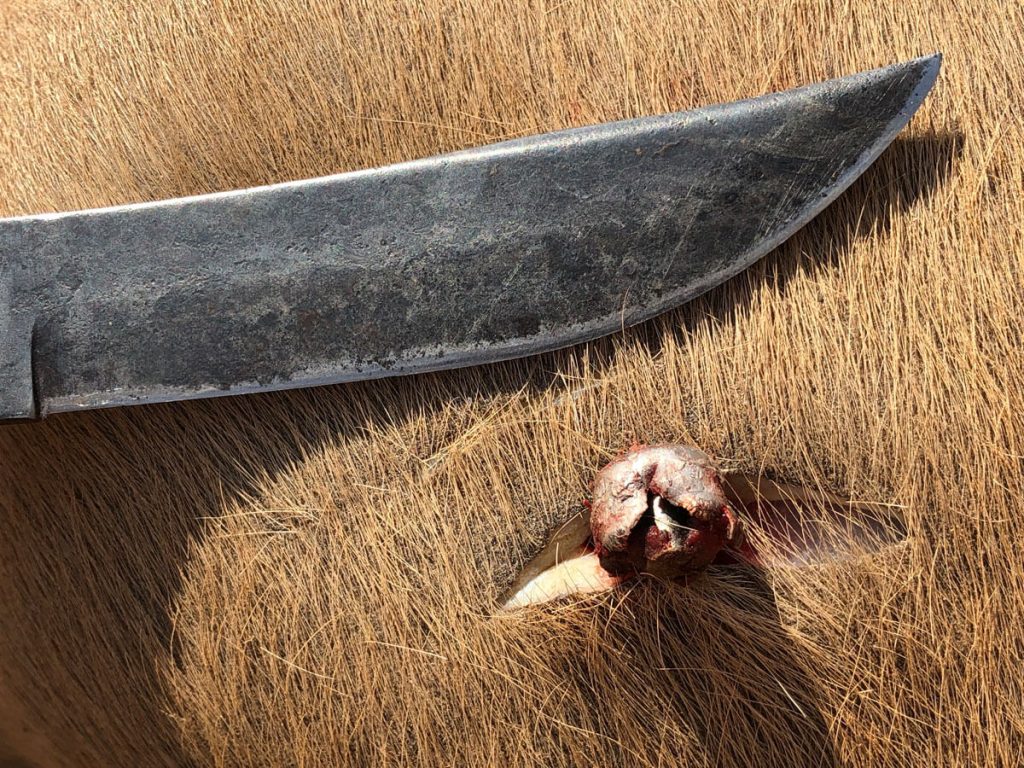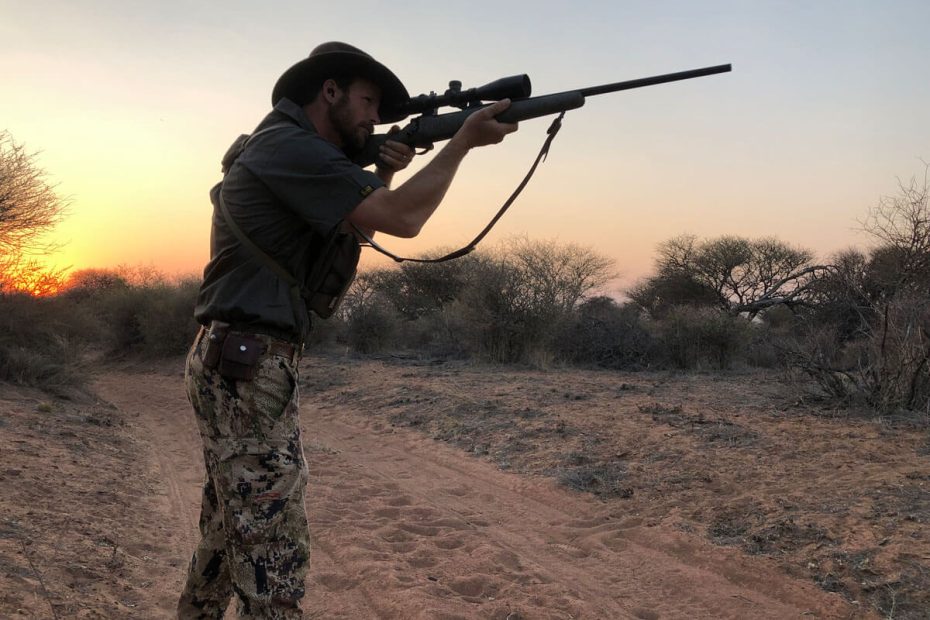
Dawn broke cold over the high country, with a threat of snow hanging in the air. Twelve cow elk grazed in a meadow at 11,500 feet, one small five-by-six bull still sleeping off his night of debauchery. I crept into place, rested my .300 Winchester Magnum atop a lightweight tripod, and squeezed the trigger. The bull never regained his feet.
Two years later I approached the same meadow, this time with a friend who carried a 6.5 Creedmoor on her shoulder and an elk tag in her pocket. Fresh elk tracks showed the way and we flushed another, bigger 5X6 bull. I cow called, my friend pressed the trigger, and another bull lay still in the snow. Both elk succumbed to a single shot. Only the duration of the kill was different. Mine died almost instantly; the other bull stayed on his feet for almost a minute, even though he was hit perfectly.

IS BIGGER BETTER?
For decades big, hard-hitting calibers held court across America’s hunting grounds. Recoil wasn’t considered the detriment it is today, indeed some shooters and hunters acclaimed hard-kicking rifles as superior, and accused those chambered in more mannerly cartridges as being sissified. This opinion was created by the projectile performance of the day. Simply put, the then-new high-velocity cartridges of the 20th century generated so much speed that traditional bullets struggled to maintain their composure when impacting heavy hide and bone. Bigger, heavier bullets had a better chance of holding together and penetrating deeply.

Today the pendulum has swung, and many hunters and shooters opine that bigger, harder-hitting calibers belong with folks of limited intelligence. According to these same hunters and shooters, anyone with enough electronic devices and high enough projectile BC (ballistic coefficient) can kill a mastodon at 1,000 yards with a 6mm Creedmoor. The one thing they do have right is that things have changed. Coming full circle, it’s all about bullet performance. Today’s premium projectiles are incredibly accurate and consistent. More to the point, they penetrate deeply and perform reliably at a wide variety of impact velocities. What this means is that today’s small, recoil-friendly calibers can kill as cleanly as yesterday’s bigger, harder-hitting calibers.

IS SMALL AND SWEET SHOOTING BETTER?
Smaller calibers and cartridges kick less. They tend to be accurate and are certainly easier to shoot well. Loaded with a premium bullet they penetrate deeply and create a devastating wound channel. They do everything a big, hard-kicking caliber can do, right?
Wrong. There are two things they can never do as well:
Hit Hard: Two elements affect how hard a bullet impacts. The first is frontal diameter. The greater the frontal diameter, the more surface area and tissue the bullet impacts directly. Remember; surface area in a circle increases exponentially as diameter increases. The second element is weight. The heavier a projectile is the harder it hits. Consider the difference between getting hit by a pencil eraser traveling at 100 feet per second (fps), and a softball traveling the same speed. Neither will penetrate your skin, but the softball will hit much harder due to greater weight and diameter.
Penetrate Deep: In a nutshell, bigger, heavier bullets penetrate deeper than smaller, lighter projectiles of the same design. That said, modern-day bullet design has leveled the scale, to a degree. Projectiles such as Barnes’ TTSX, (a monolithic, solid copper/alloy bullet), and Federal Premium’s Terminal Ascent (built with a rapid-expanding jacketed lead front and a solid copper rear portion) maintain weight and drive deep, even in lighter, more friendly calibers.
The final word, though, is that a 200-grain bullet from a .300 Win Mag will out-penetrate a same-design 130-grain bullet sent from a 6.5 PRC.

THE UPSHOT
Light/sweet-shooting calibers are easier and friendlier to shoot, and now (with premium bullets) perform and penetrate admirably. Bigger calibers kick harder, but also hit harder and penetrate better. So what is best? The answer is, of course, situation and species specific. The light/sweet crowd will say, “It’s all about shot placement. Just wait for a good broadside shot and place your bullet right in the boiler room”.
To an extent that’s true. But what if your quarry never offers you a broadside shot? Let’s consider a common elk-woods scenario: You’re on a dream hunt in the Rocky Mountains. You’ve hunted hard, and you want to kill an elk in the worst way. On the last day of your hunt, you finally find a bull, a good one with heavy six-point antlers. You’re set up on a little rocky outcropping, using your pack as a dead rest. The bull is going over a thick timbered ridge and isn’t giving you a shot at all. You keep your crosshairs on him, hoping against hope that he steps into a clearing and gives you a shot. Finally, it happens; 350 yards away he stops, turns, and bugles back down the canyon. You can see his shoulder clearly between tree trunks, but he’s steeply quartered toward you. Your crosshairs are steady, your finger on the trigger. But you subscribe to the “wait till they’re broadside” strategy, and inside your rifle’s 6.5 PRC chamber rests a rapid-expansion 140-grain bullet. What do you do?
If you’re honest and ethical, you let the bull walk.

The chance that your soft, rapid-expansion bullet will make it through the many inches of hide, flesh, bone, and sinew protecting the vitals at this angle is remote. You pull that trigger, and you’re likely in for a long, heart-wrenching recovery effort. But if you continue to wait for that broadside shot the bull will likely walk over that ridge and out of your life forever.
Now, hit rewind and change your chosen bullet to a 130-grain Federal Premium Terminal Ascent. Suddenly, you’ve completely altered this scenario. You’re not going to hit a massive old bull elk very hard with a 130-grain bullet at 350 yards, but an accurate shot with this deep-penetrating bullet will kill him, even through the point of the shoulder. And that’s what has changed. That’s the new difference.
Rewind the scenario again, and change your rifle to a .300 Win Mag. Shooting a 200-grain Federal Premium Terminal Ascent bullet, you will hit that bull very hard and kill him very quickly. No doubt about it, this is the better elk round. If you can handle the kick and shoot it well, by all means use it. But if the recoil loosens your fillings and crosses your eyes every time you squeeze the trigger, you better lighten up.

This scenario changes dramatically, of course, if the primary species you hunt is deer, pronghorn, or sheep. For smaller, lighter boned members of the big game family the 6.5 PRC and similar cartridges are optimal. Loaded with one of the premium bullets mentioned above they will penetrate into a deer’s vitals from any angle. Recoil is civilized, and terminal performance all you will ever need. But what if you use one rifle to hunt a broad spectrum of big game – elk one week, deer the next, and moose the third?

In my opinion, the ideal solution for an all-around rifle is a mid-level cartridge like the .280 Ackley Improved, .30-06 Springfield, or 7mm Remington Magnum. Recoil generated by these cartridges will not rattle your teeth or cross your eyes, yet they hit hard enough and penetrate admirably. Loaded with premium bullets, they’re cheerfully adequate for everything from coyotes to Alaskan moose.
